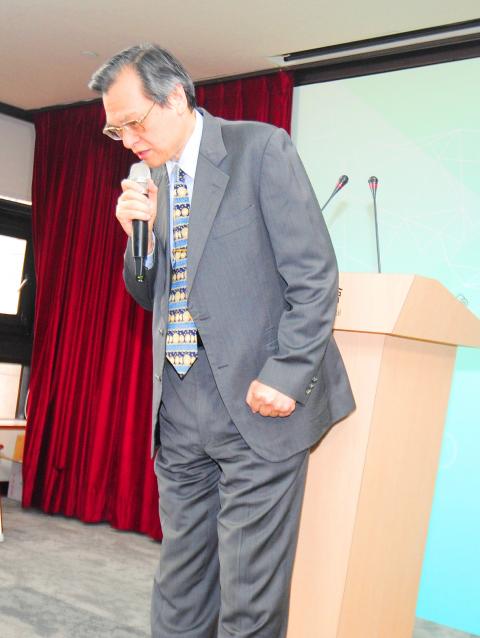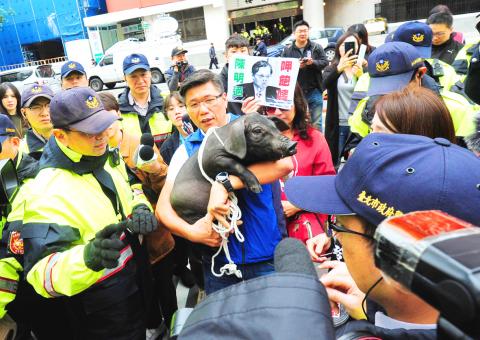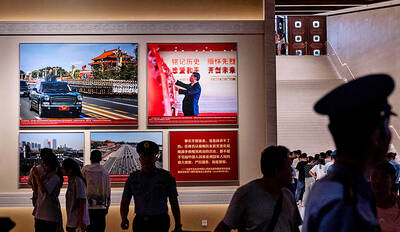Mainland Affairs Council (MAC) Minister Chen Ming-tong (陳明通) yesterday apologized to the public after his comparison of “people who only care about getting their stomach full” to “animals” attracted criticism.
“The main message of my comments yesterday [Monday] was to emphasize the importance of safeguarding our sovereignty while seeking economic development, especially given that the incident involved Chinese jets crossing the median line of the Taiwan Strait on Sunday morning, causing an unprecedented level of military pressure on Taiwan,” Chen told an impromptu news conference in Taipei.
Chen said that he would like to apologize for some of his inappropriate remarks that might have caused some members of the public to feel uncomfortable, adding that he did not mean to disrespect those working to boost Taiwan’s economy.

Photo: Wang Yi-sung, Taipei Times
He was referring to remarks he made in a radio interview on Monday, during which he said that there would be no difference between human beings and animals if humans only care about the material aspects of life and filling their stomach.
As Chen also commented on Kaohsiung Mayor Han Kuo-yu’s (韓國瑜) trip last month to Hong Kong, Macau and China — during which he stirred controversy with an unexpected meeting with Chinese Liaison Office of the Central People’s Government in the Hong Kong Special Administrative Region Director Wang Zhimin (王志民) — some local media drew a connection between Han and Chen’s “animals” comments.
Han, of the Chinese Nationalist Party (KMT), late on Monday said that the real “animals” were corrupt politicians and accused Chen of “being blind.”

Photo: Wang Yi-sung, Taipei Times
Earlier yesterday, a group of KMT lawmakers demanded at a news conference that Chen apologize for his remarks and resign.
As President Tsai Ing-wen’s (蔡英文) administration cannot sell goods to China, Han had to go to China to secure orders to better people’s livelihoods, only to be accused by Chen of being more “worthless than pigs, dogs and animals,” KMT caucus whip Johnny Chiang (江啟臣) said, adding that Chen’s remarks smacked of hubris and contempt of people who desire better lives.
Chen yesterday said that he was not targeting Han.
“You can see that my comments both before and after his trip to sell agricultural products were quite positive,” he said, urging the public to refrain from reading too much into his remarks.
Asked to comment on Chen’s apology, Han said that as the minister has already apologized, people should be more forgiving.
KMT deputy spokeswoman Hung Yu-chien (洪于茜) said that the ruling Democratic Progressive Party should engage in self-reflection if it fails to fulfill even people’s most basic needs.
“We hope he could demonstrate some empathy and understand the simple wish of many people at the grassroots level to be able to dress warmly and fill their stomach,” Hung said.
Separately, KMT New Taipei City Councilor Chen Ming-yi (陳明義) carried a black pig, a molosser and a bucket of pig excrement to the council’s building in Taipei in protest of Chen Ming-tong’s remarks.
The minister’s remarks were an insult to Taiwanese who struggle to keep themselves from the cold and hunger, he said.
MAC official Chang To-ma (張多馬), who greeted Chen Ming-yi at the protest, said that the minister’s remarks were not meant to insult the public, but to remind people that they should be wary of potential danger even when in peace.
Chang received the bucket of pig excrement on behalf of the minister, but did not take it into the building.
It was later disposed of by a janitor.
Additional reporting by Sean Lin and CNA

Three batches of banana sauce imported from the Philippines were intercepted at the border after they were found to contain the banned industrial dye Orange G, the Food and Drug Administration (FDA) said yesterday. From today through Sept. 2 next year, all seasoning sauces from the Philippines are to be subject to the FDA’s strictest border inspection, meaning 100 percent testing for illegal dyes before entry is allowed, it said in a statement. Orange G is an industrial coloring agent that is not permitted for food use in Taiwan or internationally, said Cheng Wei-chih (鄭維智), head of the FDA’s Northern Center for

The Chinese military has built landing bridge ships designed to expand its amphibious options for a potential assault on Taiwan, but their combat effectiveness is limited due to their high vulnerability, a defense expert said in an analysis published on Monday. Shen Ming-shih (沈明室), a research fellow at the Institute for National Defense and Security Research, said that the deployment of such vessels as part of the Chinese People’s Liberation Army (PLA) Navy’s East Sea Fleet signals a strong focus on Taiwan. However, the ships are highly vulnerable to precision strikes, which means they could be destroyed before they achieve their intended

About 4.2 million tourist arrivals were recorded in the first half of this year, a 10 percent increase from the same period last year, the Tourism Administration said yesterday. The growth continues to be consistent, with the fourth quarter of this year expected to be the peak in Taiwan, the agency said, adding that it plans to promote Taiwan overseas via partnerships and major events. From January to June, 9.14 million international departures were recorded from Taiwan, an 11 percent increase from the same period last year, with 3.3 million headed for Japan, 1.52 million for China and 832,962 to South Korea,

REWRITING HISTORY: China has been advocating a ‘correct’ interpretation of the victory over Japan that brings the CCP’s contributions to the forefront, an expert said An elderly Chinese war veteran’s shin still bears the mark of a bullet wound he sustained when fighting the Japanese as a teenager, a year before the end of World War II. Eighty years on, Li Jinshui’s scar remains as testimony to the bravery of Chinese troops in a conflict that killed millions of their people. However, the story behind China’s overthrow of the brutal Japanese occupation is deeply contested. Historians broadly agree that credit for victory lies primarily with the Chinese Nationalist Party (KMT)-led Republic of China (ROC) Army. Its leader, Chiang Kai-shek (蔣介石), fled to Taiwan in 1949 after losing a